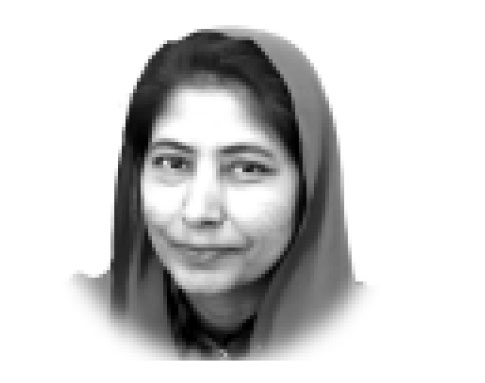DR NASREEN AKHTAR
TALKS between the United States and the Taliban failed and resumed in the recent past — both sides accused each other. The Taliban blamed the US of ‘hampering the peace negotiations” after the US Secretary Mike Pompeo’s statement that “demonstrable evidence” of reduction in violence is necessary. Whereas the Taliban responded that their stance was principled and united”. The post-Taliban Afghanistan is more chaotic, though, Taliban regime maintained peace but their ruthless rule remained highly unpopular. The US-led NATO forces ousted the Taliban regime but they failed to remove them from their soil. Presently, Afghanistan’s internal and external dimensions are shaping the regional security and political environment.America’s great shift to negotiate with the main Afghanistan’s actors, “neoTaliban” have greatly altered the regional and global politics and now they [Taliban] are going to be the ‘key player’in negotiations with the world’s only superpower. Afghanistan’s internal political and security environment has always forced Pakistan’s policy-makers to play their role to secure borders and security of Pakistan — knowingly that India would useAfghanistan’s soil against Pakistan “this must be the foundational idea of Pakistan’s policy towards Afghanistan that has gone through three cycles of war, spanning over a period of about 40 years” and the civil-war between the warlords immensely destroyed Afghanistan’s state and society. Indeed, the innocent people ofAfghanistan suffered and paid high price. Presently, Pakistan’s role is imperative between the US and the neo-Taliban. Neo- Taliban are considered flexible and modest than the previous Taliban. The emergence of neo-Taliban and the weakness of the Afghanistan’s government have exhausted the US forces. The US policy in engaging Pakistan in reconciliation process is annoying India. India believes that the departure of the US from Afghanistan would deeply affect India’s strategic interest in that country. Many analysts assume that President Trump is astutely playing. Though he seems pragmatic and rational to bring the Taliban on table-talk but who knows the “intention”. I think two factors have compelled the US to engage with the neo-Taliban, one to pull the US forces from Afghanistan. The neo-Taliban have established a much stronger foothold than ever before, in some of the northern provinces they have pushed the national security forces off their positions and captured major areas. Second reason is more troubling not only to the US but also for the whole regional and international community that is the failure ofAfghanistan’s government, and security forces — they have lost their credibility and failed to curb the neo-Taliban’s capacity despite the fact India has invested to train the Afghanistan’s army and security forces, but for peace India did nothing which has irked the Trump Administration. President Trump has sensed the heavy cost on ‘war against terrorism’in Afghanistan. He questioned his own people that “Why is not Russia there (in Afghanistan, fighting the Taliban)? Why isn’t India there? Why isn’t Pakistan there? Why are we (US) there? We are 6,000 miles away”. He has raised valid questions and he would be appreciated if he successfully signed the peace deal with the neo-Taliban. Leaving Afghanistan with honour requires Pakistan’s help— Pakistan may knowtheTaliban’s psyche morethan anyone else, whereas, Taliban trust Pakistan; otherwise, the neo-Taliban have their own independent policy vis-àvis the US. Though President Trump had rebuked Pakistan through his tweets but Pakistan responded wisely. Tension defused when Prime Minister Imran Khan met President Trump in Washington last year. Pakistan has welcomedTrump’s pragmatism whichis eventually changing regional and global political dynamics. The change rests on a fundamental shift in US’s policy from supporting India investing inAfghanistan and denied the justified role of Pakistan. Changing policy towardAfghanistan has been a part ofTrump’s election campaign –“America comes first”. In fact, President Trump has calculated the cost of US’s defence and its security interests beyond its international border from Afghanistan to the Middle East. “The character of the force — the neo-Taliban — the countries are fighting is the same”. There is no difference between the democratic and undemocratic regimes. Since the US is a liberal, democratic and powerful state, it has to maintain order for peace in the world. South Asia is known as the most dangerous region in the world, but why? We know there are two nuclear states, India and Pakistan. China is a permanent strong partner of Pakistan. China and Pakistan will benefit if peace returns to Afghanistan. Only violent regional environment would benefit India to propagate against Pakistan.Chinais keeninAfghanistan’s peace process and reconciliation. Special Representative for Afghanistan Reconciliation, Zalmay Khalilzad, is playing a significant role in finalizing the peace deal with Taliban. The peace deal between the neo-Taliban and Trump’s Administration “would set the stage for the withdrawal of the US forces by the end of 2020 if the neo-Taliban do three things: open negotiations with the US-backed Afghan government; reduce violence near the US forces controlled area; and keep foreign militants out of the areas they control”. I think, no guarantee can be given if India provides heavy assistance to the Northern Alliance — a Taliban’s rival group. India, in the past, has been supporting Northern Alliance. So what is the guarantee that India would stay away from Afghanistan’s internal affairs and would not support Taliban’s rivals? There is another concern which is being raised by the Secretary of State, Mike Pompeo, theTaliban’s conditionthat peace deal or agreement would be signed with the Islamic Emirate ofAfghanistan (IEA) which was founded by the Taliban in 1996. This is a great challenge to accept the neo-Taliban’s previous ousted regime. Hopefully, the main parties and stakeholders would agree on respectable and durable peace deal which may help the people of Afghanistan to live in a peaceful sovereign country. —The writer is Assistant Professor, IIUI, Islamabad.










